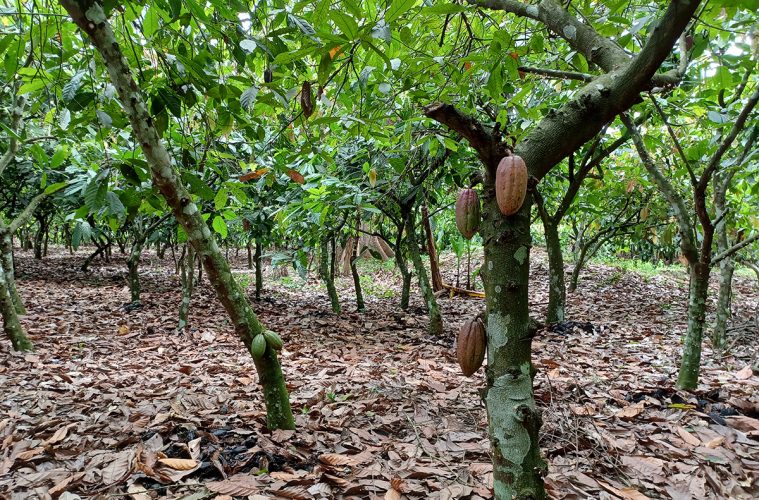One of the factors contributing to a country’s food sovereignty is the fertility of its soil. When soils are rich in organic matter, plants become more resistant to pests, yields improve, and there is reduced dependence on chemical fertilizers.
In agriculture, agroecology represents a paradigm shift. Its growth involves agronomic research in various fields, including applied soil sciences. On the Fondation Farm website (1), Jean-Baptiste Rogez, a project manager, presents some experiments conducted in West Africa to restore soil fertility in fruit crop systems.
These experiments include cocoa plantations in Côte d’Ivoire and Cameroon, but the techniques promoted appear to be applicable to all monoculture systems (such as bananas, coffee, and oil palms).

Jean-Baptiste ROGEZ, Agriculture Projects Manager, Fondation Farm
Crédits photos: Fondation Farm
Jean-Baptiste Rogez discusses these techniques in an article titled “How to Improve Soil Health in West Africa:… Restoring soil fertility is a long-term endeavor,” says the expert. In soils rich in organic matter, the ability to retain water and applied fertilizers limits soil leaching. Plants grown in these soils are also healthier and more resistant.
When improving soil fertility in cocoa plantations, the goal is not to fully restore the original soil fertility as it was when covered by equatorial forests before human deforestation. Instead, the aim is to rebuild a portion of the original organic matter stock lost since cultivation began.
Bio-inputs: In Côte d’Ivoire, the SCEB cocoa producers’ cooperative created a unit for producing organic inputs for its three hundred members. Established in 2020, this bio-factory for fertilizers and pesticides utilizes local ingredients, including microflora present in forest soil. These bio-inputs, mixed with plant and animal debris and spread on the soil, replicate the organic matter degradation process into humus that occurs in forest environments. The nutrient composition of the resulting mulch depends partly on the nature of the substrate spread and the bio-inputs used.
On larger farms, the use of bio-inputs must be combined with precision agriculture technologies that require new skills. However, this technique can be costly.
Fertile soils rich in organic matter make African countries more self-reliant. As chemical fertilizers become more effective on such soils, crops require fewer inputs, reducing both production costs and the carbon footprint.
Species Varieties: Associating multiple plant varieties on a plot initially planted with a single crop, such as cocoa, also contributes to increased soil fertility. The microbial flora enriches depending on the nature of the available and spread plant debris.
Agroforestry: Agroforestry combines wood production and cash crops on the same plot. An agroforestry ecosystem is created by planting trees amid crops. Fallen leaves and other plant debris mixed with the soil increase organic matter content after decomposition. These plots are sheltered from the wind, provide shade to plants exposed to excessive sunlight, and retain moisture during dry periods.
Success in agroforestry depends on two fundamental elements: the choice of associated species and planting density. Service trees must be selected for their socioeconomic benefits. Producers in cocoa plantations also plant other fruit tree species to ensure an additional source of income.
The right balance between crops and service trees must be found to combine economic and ecological performance. A cocoa plot converted to agroforestry must be profitable to be sustainably maintained.
Polyculture-livestock: In small subsistence farming, polyculture-livestock is common. Soil fertility improves over the years due to the addition of plant and animal organic matter.
The question of soil fertility restoration applies to the entire African continent, in all regions and for all production systems, not just monocultures.
In practice, soil regeneration must be based on accessible and replicable agricultural practices. Small-scale farmers must be able to adopt and develop them.
When grouped in cooperatives, “they find solutions to better organize themselves, in addition to technical support, training, and product valorization,” says Jean-Baptiste Rogez. However, without financing, no group action is possible.
(1) Fondation Farm




